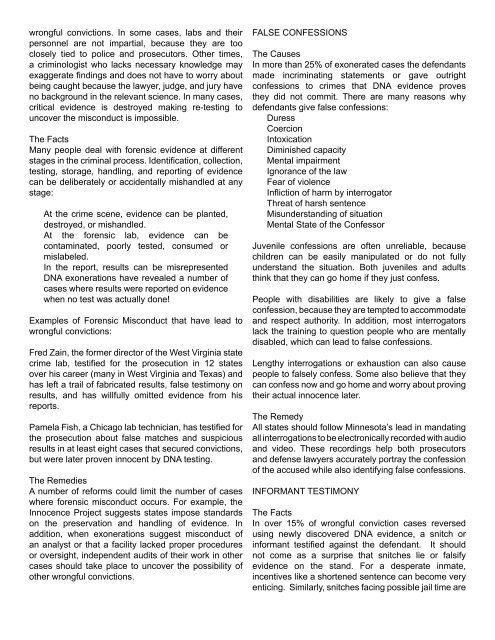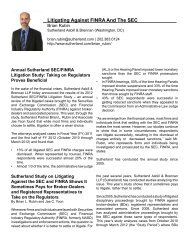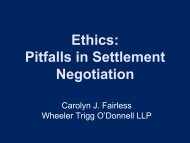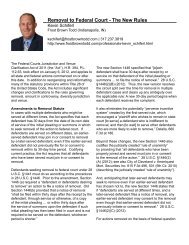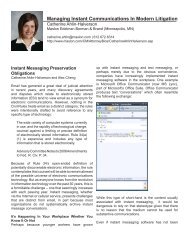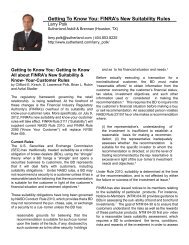Materials - The Network of Trial Law Firms
Materials - The Network of Trial Law Firms
Materials - The Network of Trial Law Firms
Create successful ePaper yourself
Turn your PDF publications into a flip-book with our unique Google optimized e-Paper software.
wrongful convictions. In some cases, labs and theirpersonnel are not impartial, because they are tooclosely tied to police and prosecutors. Other times,a criminologist who lacks necessary knowledge mayexaggerate findings and does not have to worry aboutbeing caught because the lawyer, judge, and jury haveno background in the relevant science. In many cases,critical evidence is destroyed making re-testing touncover the misconduct is impossible.<strong>The</strong> FactsMany people deal with forensic evidence at differentstages in the criminal process. Identification, collection,testing, storage, handling, and reporting <strong>of</strong> evidencecan be deliberately or accidentally mishandled at anystage:At the crime scene, evidence can be planted,destroyed, or mishandled.At the forensic lab, evidence can becontaminated, poorly tested, consumed ormislabeled.In the report, results can be misrepresentedDNA exonerations have revealed a number <strong>of</strong>cases where results were reported on evidencewhen no test was actually done!Examples <strong>of</strong> Forensic Misconduct that have lead towrongful convictions:Fred Zain, the former director <strong>of</strong> the West Virginia statecrime lab, testified for the prosecution in 12 statesover his career (many in West Virginia and Texas) andhas left a trail <strong>of</strong> fabricated results, false testimony onresults, and has willfully omitted evidence from hisreports.Pamela Fish, a Chicago lab technician, has testified forthe prosecution about false matches and suspiciousresults in at least eight cases that secured convictions,but were later proven innocent by DNA testing.<strong>The</strong> RemediesA number <strong>of</strong> reforms could limit the number <strong>of</strong> caseswhere forensic misconduct occurs. For example, theInnocence Project suggests states impose standardson the preservation and handling <strong>of</strong> evidence. Inaddition, when exonerations suggest misconduct <strong>of</strong>an analyst or that a facility lacked proper proceduresor oversight, independent audits <strong>of</strong> their work in othercases should take place to uncover the possibility <strong>of</strong>other wrongful convictions.FALSE CONFESSIONS<strong>The</strong> CausesIn more than 25% <strong>of</strong> exonerated cases the defendantsmade incriminating statements or gave outrightconfessions to crimes that DNA evidence provesthey did not commit. <strong>The</strong>re are many reasons whydefendants give false confessions:DuressCoercionIntoxicationDiminished capacityMental impairmentIgnorance <strong>of</strong> the lawFear <strong>of</strong> violenceInfliction <strong>of</strong> harm by interrogatorThreat <strong>of</strong> harsh sentenceMisunderstanding <strong>of</strong> situationMental State <strong>of</strong> the ConfessorJuvenile confessions are <strong>of</strong>ten unreliable, becausechildren can be easily manipulated or do not fullyunderstand the situation. Both juveniles and adultsthink that they can go home if they just confess.People with disabilities are likely to give a falseconfession, because they are tempted to accommodateand respect authority. In addition, most interrogatorslack the training to question people who are mentallydisabled, which can lead to false confessions.Lengthy interrogations or exhaustion can also causepeople to falsely confess. Some also believe that theycan confess now and go home and worry about provingtheir actual innocence later.<strong>The</strong> RemedyAll states should follow Minnesota’s lead in mandatingall interrogations to be electronically recorded with audioand video. <strong>The</strong>se recordings help both prosecutorsand defense lawyers accurately portray the confession<strong>of</strong> the accused while also identifying false confessions.INFORMANT TESTIMONY<strong>The</strong> FactsIn over 15% <strong>of</strong> wrongful conviction cases reversedusing newly discovered DNA evidence, a snitch orinformant testified against the defendant. It shouldnot come as a surprise that snitches lie or falsifyevidence on the stand. For a desperate inmate,incentives like a shortened sentence can become veryenticing. Similarly, snitches facing possible jail time are


